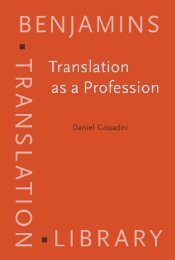Constructing a Sociology of Translation.pdf
Constructing a Sociology of Translation.pdf
Constructing a Sociology of Translation.pdf
- No tags were found...
Create successful ePaper yourself
Turn your PDF publications into a flip-book with our unique Google optimized e-Paper software.
<strong>Constructing</strong> the pr<strong>of</strong>essional field <strong>of</strong> translation 51lieved to have the power to create unique intellectual products. The God-Authorand the authorised Word <strong>of</strong> God were replaced by the Author-God, as RolandBarthes called him, not without irony (Barthes 1977: 146). The task <strong>of</strong> the translatorconsequently was to copy this unique intellectual product. Schleiermacher’sconcept <strong>of</strong> alienation added a further dimension. Here literalness also paves theway to the otherness <strong>of</strong> the other which is reflected in the linguistic habitus (Berman1992).There was little change with regard to the social position and power <strong>of</strong> translators,however. Having adopted the habitus <strong>of</strong> the servant and invisible communicatorthey had ended up in a situation from which there was no way out. The status<strong>of</strong> the Author-God derived not only from his intellectual genius but also fromthe positive formulation <strong>of</strong> the concept <strong>of</strong> intellectual property. While authorseventually, in the nineteenth century, won the ideological, social and legal battlefor the sole rights to their texts, the translators clearly lacked the social backing,as well as the cultural and symbolic capital and even more so the financial capital,that would have allowed them to secure the right to be an equal partner in thesignification process. They were under political, ideological and financial pressurefrom clients and publishers, and also had to battle against the monopolisation<strong>of</strong> interpretations. While in the past it was the church that controlled the interpretation<strong>of</strong> texts, in the secularised world this control is exerted by the new andpr<strong>of</strong>essional exegetes in translator-mediated interactions who claim this interpretivemonopoly for themselves: the hermeneutists for fictional and philosophicaltexts, lawyers for legal texts, therapists in therapeutical sessions etc. What they allhave in common is that they believe in the identity <strong>of</strong> the word and truth and thattransparent transcoding will give them access to the meaning <strong>of</strong> texts.Although it is precisely this belief in the identity <strong>of</strong> the word and truth whichis cast into doubt in our post-modern world, while the notion <strong>of</strong> the interpretiveopenness <strong>of</strong> the text is generally accepted, translators still hide behind theillusion <strong>of</strong> objectivity. This leads to an almost schizophrenic constellation <strong>of</strong> selfconstructedtranslator identities which combine the pariah habitus and the selfsacrifice and self-mutilation demanded by others.This may also explain why translators who are involved in the creation <strong>of</strong>textual worlds, <strong>of</strong> meaning and value constructions, are loathe to admit their creativeinvolvement in the current codes <strong>of</strong> ethics. Neither their other nor their selfconstruedidentities allow translators to overcome the habitus <strong>of</strong> the servant so asto self-confidently confront the circle <strong>of</strong> social meaning and value constructions.This brief overview <strong>of</strong> the history <strong>of</strong> translation theory and translation shows thatdue to the underlying socio-historical restrictions translators hardly ever succeededin overcoming their self-construed or imposed pariah status and orientatingthemselves by historical configurations, metaphors and personalities in their
















